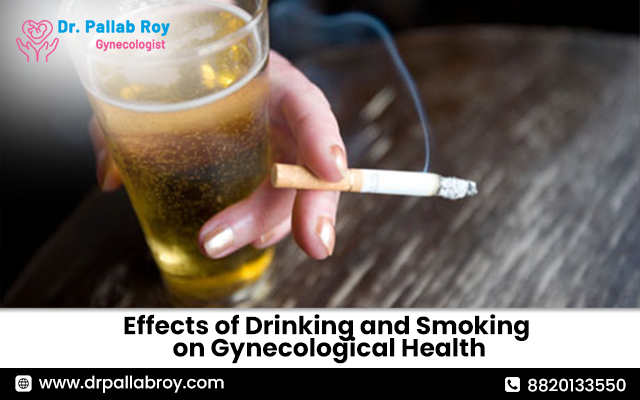Introduction
Maintaining optimal gynecological health is crucial for overall well-being and lifestyle habits like drinking alcohol and smoking can significantly impact women’s reproductive health. Understanding these effects can empower individuals to make informed choices and prioritize their health. Here’s a comprehensive look by the best gynaecologist doctor in Garia at how drinking and smoking influence gynecological health.
Effects of Drinking on Gynecological Health
Alcohol consumption can affect various aspects of gynecological health, including:
- Menstrual Cycle Irregularities: Excessive alcohol intake can disrupt hormonal balance, resulting in irregular menstrual cycles or even amenorrhea (absence of menstruation).
- Fertility: Chronic alcohol use can impair fertility by affecting ovulation and reducing the likelihood of conception. It can also increase the risk of miscarriage and complications during pregnancy.
- Sexual Health: Alcohol can decrease sexual arousal and impair sexual function, impacting intimacy and overall sexual health.
- Breast Health: Alcohol consumption has been linked to an increased risk of breast cancer. It can also interfere with breast health screenings and early detection of abnormalities.
- Bone Health: Alcohol can contribute to decreased bone density, increasing the chances of developing osteoporosis and fractures, particularly in postmenopausal women.
Effects of Smoking on Gynecological Health:
As per the best gynaecologist doctor in Garia, smoking tobacco products can have profound effects on gynecological health:
- Fertility and Pregnancy: Smoking reduces fertility in both men and women. In women, it can damage the fallopian tubes, interfere with the implantation of the fertilized egg and increase the risk of ectopic pregnancy and miscarriage.
- Menstrual Disorders: Smoking can disrupt the menstrual cycle, leading to irregular periods or amenorrhea. It may also exacerbate symptoms of premenstrual syndrome (PMS).
- Hormonal Imbalance: Smoking alters hormone levels, particularly estrogen, which can contribute to conditions like polycystic ovary syndrome (PCOS) and endometriosis.
- Cervical Health: Smoking increases the risk of cervical cancer and delays healing after cervical procedures. It also weakens the immune system’s ability to fight HPV infections, a primary cause of cervical cancer.
- Menopause: Smoking can accelerate the onset of menopause and increase the severity of symptoms such as hot flashes and osteoporosis.
Conclusion:
Women are encouraged to consult with the best gynaecologist doctor in Garia for guidance on maintaining optimal gynecological health through lifestyle modifications and appropriate medical interventions. By prioritizing gynecological health and making informed choices, women can safeguard their reproductive health and enjoy a healthier life.

